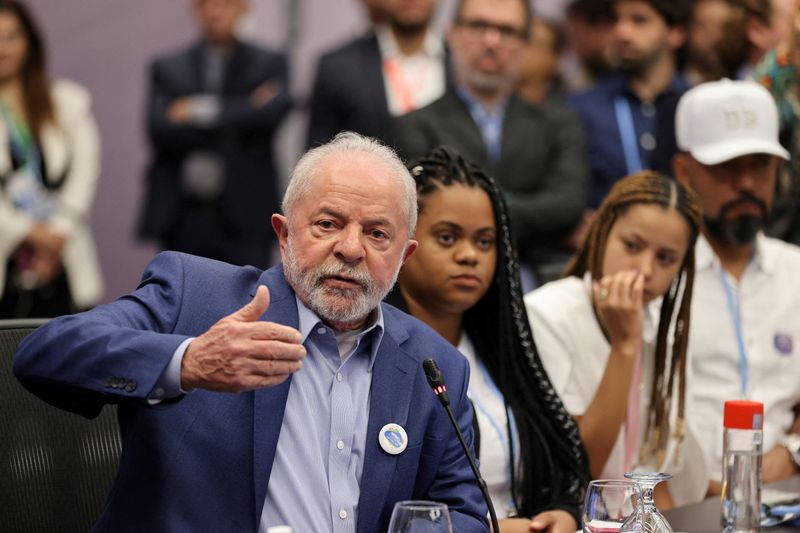SAO PAULO (Reuters) -Brazilian President Luiz Inacio Lula da Silva said on Tuesday he wanted Argentina to join the BRICS group of emerging countries, as Brazil's neighbor struggles with a lack of foreign reserves.
"It is very important for Argentina to be in BRICS," Lula said in a live broadcast on social media as he attends the bloc's summit in South Africa.
BRICS, which is not a formal multilateral organization, focuses on boosting economic and trade cooperation between member countries Brazil, Russia, India, China and South Africa.
Argentina is struggling with historic inflation, dried-up foreign reserves and debt repayments as part of a $44 billion loan deal with the International Monetary Fund (IMF).
Lula criticized the IMF's loans as "suffocating" and hinted at the possibility of the BRICS bank increasing lending to other countries with "different criteria" to stimulate their economies.
Argentina, whose largest trade partner is Brazil, has previously said it intended to join the BRICS bloc.
The South American country, however, is scheduled to hold its presidential election next month and the winner of the primary vote, far-right libertarian candidate Javier Milei, has voiced criticism of China and Brazil.
Lula also said he was in favor of other countries joining the alliance, mentioning Indonesia as a potential new member.
He later added in a speech at a business forum that new partners would help BRICS increase its relevance on an international scale.
More than 40 countries have expressed interest in joining the bloc, and nearly two dozen have formally asked to be admitted, according to South African officials.
"We want BRICS to be a multilateral institution, not an exclusive club," Lula said, though he added any new members would need to meet certain conditions, so the group does not become a "Tower of Babel."
Ian Bremmer, the head of political risk consultancy Eurasia, said on social media platform X he sees Indonesia and Saudi Arabia as the most likely to join the group in the near term.
Lula has also defended a common trading currency to be used between BRICS countries, saying on Tuesday the move would not be aimed at replacing national currencies or "rejecting" the U.S. dollar, but to facilitate trade between the emerging nations.

The bloc is also not meant to act as a challenger to the United States or to formal organizations such as the Group of 7 (G7) or Group of 20 (G20), Lula added, but to "organize" the so-called Global South.
"We do not want to be a counterpoint to the G7, G20 or the United States," Lula said. "We just want to organize ourselves."